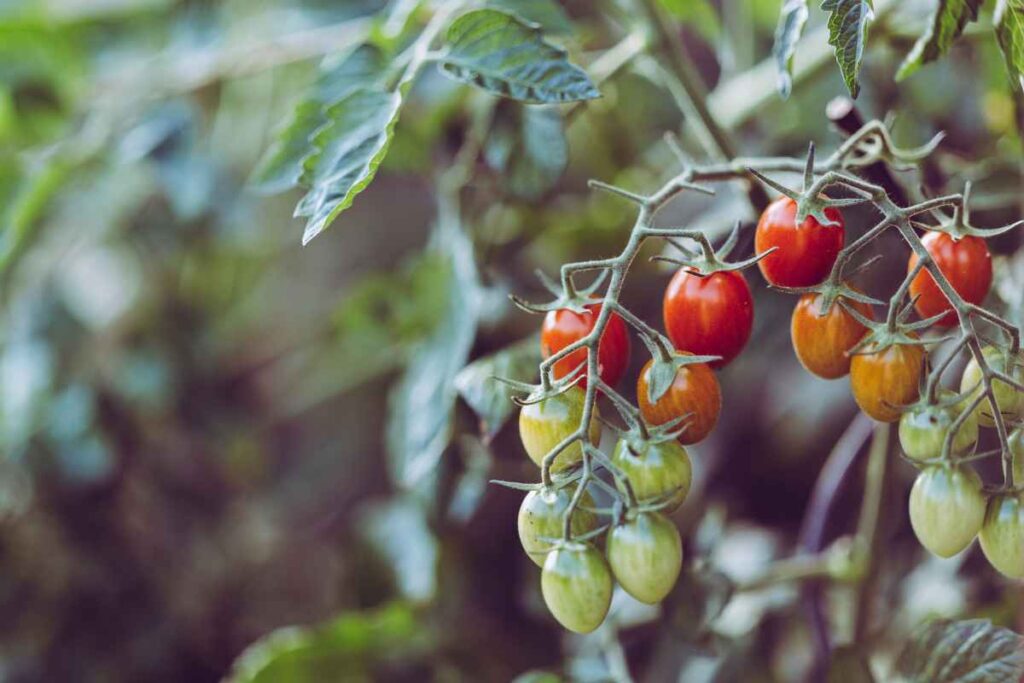Are you a tomato lover looking for a natural and effective way to fertilize your plants? If so, you might have heard of worm castings – a nutrient-rich organic fertilizer that is gaining popularity among gardeners. But are worm castings good for tomatoes?
Yes, worm castings are really good for tomato plants. Worm castings are a natural and sustainable fertilizer made from the waste produced by earthworms.
As earthworms consume organic matter, they break it down and release it in a form that is easily absorbed by plants.
This process makes a nutrient-rich substance that is packed with vital minerals and microorganisms that help plants thrive well.
Nutrients in worm castings

Worm castings are natural essential nutrients that are crucial for plant growth and development. They contain high levels of nitrogen, phosphorus, and potassium referred to as the NPK ratio. In worm casting, the NPK is 5.5.3. These macronutrients are responsible for various functions in plants, such as leaf and stem growth, root development, and flower and fruit production.
Another key component of worm castings is the presence of beneficial microorganisms. These microorganisms help to break down organic matter and release nutrients in a form that is easily absorbed by plants. They also help to suppress harmful pathogens and pests, while promoting overall plant health.
By using worm castings as a natural fertilizer for your tomato plants, you can provide them with a rich source of nutrients that will help them thrive. The nutrients in worm castings are released slowly over time, providing a steady supply of nutrition to plants without the risk of over-fertilization.
Also Read: Is Wood Ash Good for Tomatoes?
Benefits of using worm castings for tomatoes
Worm castings are like a superfood for your soil and plants. They contain organic matter and beneficial microorganisms that can help improve the health and structure of your soil.
That is essential for your plant because healthy soil means healthy roots and healthy roots mean healthy and productive tomato plants.
When you use worm castings as a natural fertilizer, you are also providing your tomato plants with a steady supply of nutrients.
Unlike synthetic fertilizers that can be harmful to the environment and cause nutrient imbalances in plants, worm castings release nutrients slowly over time.
This means that your plants have access to all the essential nutrients they need to grow strong, healthy, and productive.
Moreover, worm castings can also help protect your tomato plants from harmful pathogens and pests. The beneficial microorganisms present in worm castings can help to keep harmful bacteria and fungi away.
Finally, using worm castings is a sustainable and eco-friendly option for fertilizing your tomato plants. Synthetic fertilizers can be harmful to the environment, but worm castings are all-natural and can help your plant grow well.
How to Use Worm Castings for Tomatoes?
The first step is to make sure you have high-quality worm castings. You can buy them from a garden centre or online, or you can make your own by composting them with worms. Either way, make sure you are using fresh, well-composted worm castings for the best results.
The first way to use worm casting is to mix the castings into your soil before planting. This will help improve soil health and provide a natural source of nutrients for your tomato plants.
Another way to use worm castings for tomatoes is to create a worm-casting tea. This is a liquid fertilizer that can be applied to your tomato plants throughout the growing season.
To make worm-casting tea, simply steep a small amount of worm castings (about 1-2 cups) in a gallon of water for 24-48 hours. Once the tea is ready, strain out any solids and apply the liquid to the soil around your tomato plants. This will provide your plants with a quick boost of nutrients and help improve soil health.
You can also use worm castings as a top dressing for your tomato plants. Simply sprinkle a small amount of castings around the base of each plant. That will help release nutrients slowly over time and improve soil structure.
Finally, you can use worm castings to create a compost tea. This is similar to worm-casting tea, but you’ll also add other compostable materials to the mix. Compost tea can help provide your tomato plants with a range of nutrients and beneficial microorganisms, helping them grow strong and healthy.
Comparison with other fertilizers
First, let’s look at synthetic fertilizers. These are fertilizers that are chemically produced, and they can provide a quick boost of nutrients to your plants.
However, synthetic fertilizers can also have some downsides. They can be harsh on your tomato plants and cause nutrient imbalances if you do not use them correctly.
Also, synthetic fertilizers do not contain organic matter or beneficial microorganisms, which are important for soil health and plant growth.
On the other hand, organic fertilizers are made from natural materials such as compost or manure. Like worm castings, they can help improve soil health and provide a slow release of nutrients to your tomato plants.
However, not all organic fertilizers are created equal. Others, like compost, may not provide the complete range of nutrients that your tomato plants need to grow strong and healthy.
Worm castings are a great option for organic and natural fertilization. They contain a wide range of nutrients that your tomato plants need, including nitrogen, phosphorus, and potassium.
Moreover, worm castings are easy to use and apply. You can mix them into the soil, create a tea or top dressing, or add them to your compost pile. And, because they are all-natural, you can feel good about using them in your garden without harming the environment.
How to make your own worm castings
Here’s how you can make your own worm castings –
Step 1: Get a worm bin.
You can purchase a worm bin or make your own using a container with a lid. Make sure the bin is big enough to hold your kitchen scraps and worms.
Step 2: Add bedding.
Worms need bedding to live in, and shredded newspaper or cardboard works great. Wet the bedding and fluff it up to create an airy environment for your worms.
Step 3: Add your worms.
You can purchase red wiggler worms from a garden shop or online. Add them to your bin and cover them with bedding.
Step 4: Feed your worms.
Your worms will eat kitchen scraps like fruit and vegetable peels, coffee grounds, and eggshells. Avoid adding meat or dairy products as they can attract pests and smell bad.
Step 5: Harvest your worm castings.
Your worms will turn your kitchen scraps into nutrient-rich worm castings over time. You can harvest them by separating them from the bedding. Store your worm castings in a dry, cool place until you’re ready to use them.
Conclusion
Using worm castings for your tomato plants can be a great way to provide them with the nutrients they need to grow strong and healthy. Worm castings are rich in nutrients, easy to use, and help improve soil health. Plus, they’re an all-natural and environmentally friendly option.
Whether you’re a beginner or an experienced gardener, using worm castings can be a great addition to your gardening routine. You can purchase them online or at a gardening store, or even make your own using a worm bin.
